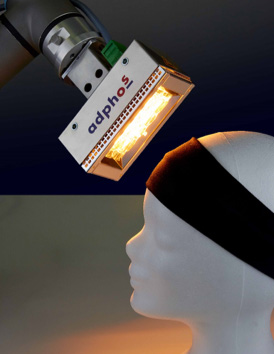At TheIJC USA Conference, April 12-13, the adphos group will demonstrate how adphosNIR® technology allows users to dry and cure water and eco-solvent based inkjet inks in fractions of the time, space, and electricity of conventional systems.
BROOKFIELD, WI – March 26th, 2018 – adphos will be demonstrating updates to its family of drying and curing systems specifically designed for improved post-processing and NIR-Instantaneous drying and curing of inkjet inks on temperature sensitive substrates at TheIJC USA Annual Inkjet Conference, April 12-13 in Chicago.
Robotically Controlled adphosNIR50-50
The Robotically Controlled adphosNIR50-50 is a direct result from user demand to quickly dry and cure water and eco-solvent inkjet inks on temperature sensitive substrates with a compact form factor. Inkjet technologies and ink chemistries are constantly evolving, and companies are looking for greater efficiencies, new methods, and advanced inkjet applications to drive their businesses. To accomplish this, adphosNIR® allows users to dry and cure water and eco-solvent inkjet inks on temperature sensitive substrates in fractions of the time, space, and electricity of conventional systems. Adphos will be demonstrating drying and curing of inkjet inks on PET, textile, plastics, and even chocolates with proprietary adphosNIR® technology.
Highlights:
- – NIR-Instantaneous drying with adphosNIR®
- – Drying and curing on PET, textiles, plastics, and chocolates
- – Expanded capability on OEM inkjet presses and devices
- – Low thermal stress on substrates for improved post processing speeds and efficiencies
Benefits of Instantaneous Drying and Post-Processing with Dr. Bär
Dr. Kai Bär will be speaking about a large variety of inkjet applications, as they relate to component geometries, substrate materials and coating types. With one of today’s biggest limitations being drying and post-printing processing, Dr. Bär will describe how instantaneous and low thermal stress adphosNIR® drying technology can overcome these limitations.
In addition to the presentation, several real-world case studies will further solidify the principles of adphosNIR® technology and why users should considerer this as an option for inkjet printed textiles, plastics, printed electronics, biomaterials, and other applications and substrates.


